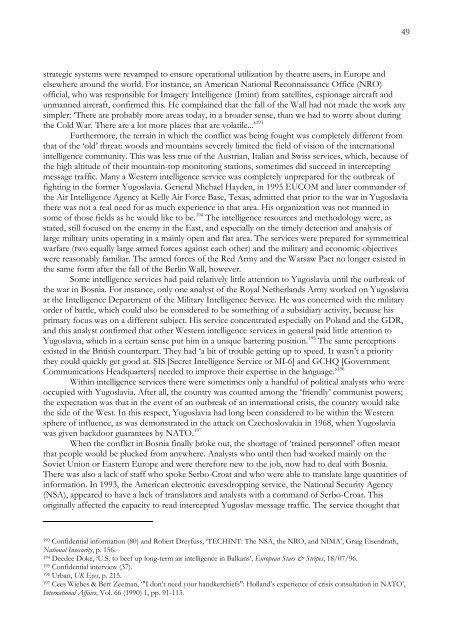C. Wiebes - Intelligence en de oorlog in Bosnië 1992-1995. De rol van de inlichtingen- en veiligheidsdiensten - Engels
C. Wiebes - Intelligence en de oorlog in Bosnië 1992-1995. De rol van de inlichtingen- en veiligheidsdiensten - Engels
C. Wiebes - Intelligence en de oorlog in Bosnië 1992-1995. De rol van de inlichtingen- en veiligheidsdiensten - Engels
- No tags were found...
Create successful ePaper yourself
Turn your PDF publications into a flip-book with our unique Google optimized e-Paper software.
49strategic systems were revamped to <strong>en</strong>sure operational utilization by theatre users, <strong>in</strong> Europe an<strong>de</strong>lsewhere around the world. For <strong>in</strong>stance, an American National Reconnaissance Office (NRO)official, who was responsible for Imagery <strong>Intellig<strong>en</strong>ce</strong> (Im<strong>in</strong>t) from satellites, espionage aircraft andunmanned aircraft, confirmed this. He compla<strong>in</strong>ed that the fall of the Wall had not ma<strong>de</strong> the work anysimpler: ‘There are probably more areas today, <strong>in</strong> a broa<strong>de</strong>r s<strong>en</strong>se, than we had to worry about dur<strong>in</strong>gthe Cold War. There are a lot more places that are volatile...’ 193Furthermore, the terra<strong>in</strong> <strong>in</strong> which the conflict was be<strong>in</strong>g fought was completely differ<strong>en</strong>t fromthat of the ‘old’ threat: woods and mounta<strong>in</strong>s severely limited the field of vision of the <strong>in</strong>ternational<strong>in</strong>tellig<strong>en</strong>ce community. This was less true of the Austrian, Italian and Swiss services, which, because ofthe high altitu<strong>de</strong> of their mounta<strong>in</strong>-top monitor<strong>in</strong>g stations, sometimes did succeed <strong>in</strong> <strong>in</strong>tercept<strong>in</strong>gmessage traffic. Many a Western <strong>in</strong>tellig<strong>en</strong>ce service was completely unprepared for the outbreak offight<strong>in</strong>g <strong>in</strong> the former Yugoslavia. G<strong>en</strong>eral Michael Hayd<strong>en</strong>, <strong>in</strong> 1995 EUCOM and later comman<strong>de</strong>r ofthe Air <strong>Intellig<strong>en</strong>ce</strong> Ag<strong>en</strong>cy at Kelly Air Force Base, Texas, admitted that prior to the war <strong>in</strong> Yugoslaviathere was not a real need for as much experi<strong>en</strong>ce <strong>in</strong> that area. His organization was not manned <strong>in</strong>some of those fields as he would like to be. 194 The <strong>in</strong>tellig<strong>en</strong>ce resources and methodology were, asstated, still focused on the <strong>en</strong>emy <strong>in</strong> the East, and especially on the timely <strong>de</strong>tection and analysis oflarge military units operat<strong>in</strong>g <strong>in</strong> a ma<strong>in</strong>ly op<strong>en</strong> and flat area. The services were prepared for symmetricalwarfare (two equally large armed forces aga<strong>in</strong>st each other) and the military and economic objectiveswere reasonably familiar. The armed forces of the Red Army and the Warsaw Pact no longer existed <strong>in</strong>the same form after the fall of the Berl<strong>in</strong> Wall, however.Some <strong>in</strong>tellig<strong>en</strong>ce services had paid relatively little att<strong>en</strong>tion to Yugoslavia until the outbreak ofthe war <strong>in</strong> Bosnia. For <strong>in</strong>stance, only one analyst of the Royal Netherlands Army worked on Yugoslaviaat the <strong>Intellig<strong>en</strong>ce</strong> <strong>De</strong>partm<strong>en</strong>t of the Military <strong>Intellig<strong>en</strong>ce</strong> Service. He was concerned with the militaryor<strong>de</strong>r of battle, which could also be consi<strong>de</strong>red to be someth<strong>in</strong>g of a subsidiary activity, because hisprimary focus was on a differ<strong>en</strong>t subject. His service conc<strong>en</strong>trated especially on Poland and the GDR,and this analyst confirmed that other Western <strong>in</strong>tellig<strong>en</strong>ce services <strong>in</strong> g<strong>en</strong>eral paid little att<strong>en</strong>tion toYugoslavia, which <strong>in</strong> a certa<strong>in</strong> s<strong>en</strong>se put him <strong>in</strong> a unique barter<strong>in</strong>g position.195 The same perceptionsexisted <strong>in</strong> the British counterpart. They had ‘a bit of trouble gett<strong>in</strong>g up to speed. It wasn’t a prioritythey could quickly get good at. SIS [Secret <strong>Intellig<strong>en</strong>ce</strong> Service or MI-6] and GCHQ [Governm<strong>en</strong>tCommunications Headquarters] nee<strong>de</strong>d to improve their expertise <strong>in</strong> the language.’ 196With<strong>in</strong> <strong>in</strong>tellig<strong>en</strong>ce services there were sometimes only a handful of political analysts who wereoccupied with Yugoslavia. After all, the country was counted among the ‘fri<strong>en</strong>dly’ communist powers;the expectation was that <strong>in</strong> the ev<strong>en</strong>t of an outbreak of an <strong>in</strong>ternational crisis, the country would takethe si<strong>de</strong> of the West. In this respect, Yugoslavia had long be<strong>en</strong> consi<strong>de</strong>red to be with<strong>in</strong> the Westernsphere of <strong>in</strong>flu<strong>en</strong>ce, as was <strong>de</strong>monstrated <strong>in</strong> the attack on Czechoslovakia <strong>in</strong> 1968, wh<strong>en</strong> Yugoslaviawas giv<strong>en</strong> backdoor guarantees by NATO. 197Wh<strong>en</strong> the conflict <strong>in</strong> Bosnia f<strong>in</strong>ally broke out, the shortage of ‘tra<strong>in</strong>ed personnel’ oft<strong>en</strong> meantthat people would be plucked from anywhere. Analysts who until th<strong>en</strong> had worked ma<strong>in</strong>ly on theSoviet Union or Eastern Europe and were therefore new to the job, now had to <strong>de</strong>al with Bosnia.There was also a lack of staff who spoke Serbo-Croat and who were able to translate large quantities of<strong>in</strong>formation. In 1993, the American electronic eavesdropp<strong>in</strong>g service, the National Security Ag<strong>en</strong>cy(NSA), appeared to have a lack of translators and analysts with a command of Serbo-Croat. Thisorig<strong>in</strong>ally affected the capacity to read <strong>in</strong>tercepted Yugoslav message traffic. The service thought that193 Confid<strong>en</strong>tial <strong>in</strong>formation (80) and Robert Dreyfuss, ‘TECHINT: The NSA, the NRO, and NIMA’, Graig Eis<strong>en</strong>drath,National Insecurity, p. 156.194 <strong>De</strong>e<strong>de</strong>e Doke, ‘U.S. to beef up long-term air <strong>in</strong>tellig<strong>en</strong>ce <strong>in</strong> Balkans’, European Stars & Stripes, 18/07/96.195 Confid<strong>en</strong>tial <strong>in</strong>terview (37).196 Urban, UK Eyes, p. 215.197 Cees <strong>Wiebes</strong> & Bert Zeeman, ‘"I don’t need your handkerchiefs": Holland’s experi<strong>en</strong>ce of crisis consultation <strong>in</strong> NATO’,International Affairs, Vol. 66 (1990) 1, pp. 91-113.





